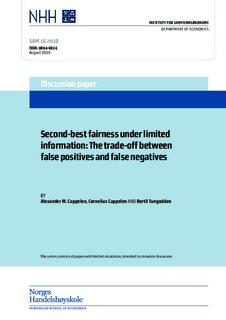| dc.contributor.author | Cappelen, Alexander W. | |
| dc.contributor.author | Cappelen, Cornelius | |
| dc.contributor.author | Tungodden, Bertil | |
| dc.date.accessioned | 2018-08-31T07:35:47Z | |
| dc.date.available | 2018-08-31T07:35:47Z | |
| dc.date.issued | 2018-08 | |
| dc.identifier.issn | 0804-6824 | |
| dc.identifier.uri | http://hdl.handle.net/11250/2560188 | |
| dc.description.abstract | In many important economic settings, limited information makes it impossible for decision makers to ensure that each individual gets what he or she deserves. Decision makers are then faced with the trade-off between giving some
individuals more than they deserve, false positives, and giving some individuals less than they deserve, false negatives. We present the results from a large-scale experimental study of how people trade off these two mistakes in distributive choices. We find that a majority are more concerned with avoiding false negatives than with avoiding false positives, but we also document heterogeneity with respect to how people make this trade-off. The findings shed important light on people’s attitudes to a wide range of policies by providing novel evidence on an
important dimension of people’s social preference. | nb_NO |
| dc.language.iso | eng | nb_NO |
| dc.publisher | Institutt for samfunnsøkonomi, NHH | nb_NO |
| dc.relation.ispartofseries | DP SAM;18/2018 | |
| dc.title | Second-best fairness under limited information: The trade-off between false positives and false negatives | nb_NO |
| dc.type | Working paper | nb_NO |
| dc.source.pagenumber | 33 | nb_NO |
